GOOGLE’S DEC 2020 CORE ALGORITHM UPDATE IS HERE
Oliver Levenson • December 3, 2020
On Dec 3rd, 2020, Google began rolling out a new core algorithm update, and as always it made some people happy, while others weren’t as pleased about it.

Google keeps making smaller modifications to its ranking formulas almost every day, but the big changes are made only about three times annually. This is also the reason why the recent change was anxiously anticipated since May 2020, when the last one took place.
Like always, Google responded to queries and comments by referring to their boilerplate recommendations of the past like what webmasters should know about Google’s core updates and the 175-page general guidelines for search quality evaluators.
Simply put, Google reflected their casual, don’t worry if you lost rankings attitude by saying...
"pages that drop after a core update don’t have anything wrong to fix."
But, if you still feel you need to do something, try "focusing on ensuring you’re offering the best content you can". The same old line that they use whenever they are asked about getting your page ranked.
What Can Be Done
Even if your rankings have tanked as a result of the last core update, there are no specific actions that
you can take to recover, says Google. They also went on to say that negative rankings do not mean
there is anything wrong with your pages. That said, we haven’t noticed any rank drop for our clients due
to this update.
Google does suggest a list of questions to consider, based on different categories.
Content and Quality Questions
Does the content provide original information, reporting, research or analysis?
Does the content provide a substantial, complete or comprehensive description of the topic?
Does the content provide insightful analysis or interesting information that is beyond obvious?
If the content draws on other sources, does it avoid simply copying or rewriting from those
sources and instead provide substantial additional value and originality?
Expertise Questions
Does the content present information in a way that makes you want to trust it, such as clear
sourcing, evidence of the expertise involved, background about the author, or the site that
publishes it through links to an author page or a site’s About page?
Presentation and Production Questions
Does content display well for mobile devices when viewed on them?
You might also want to schedule a call to discuss
comparing rank volatility and average position change. It also lists winners and losers!
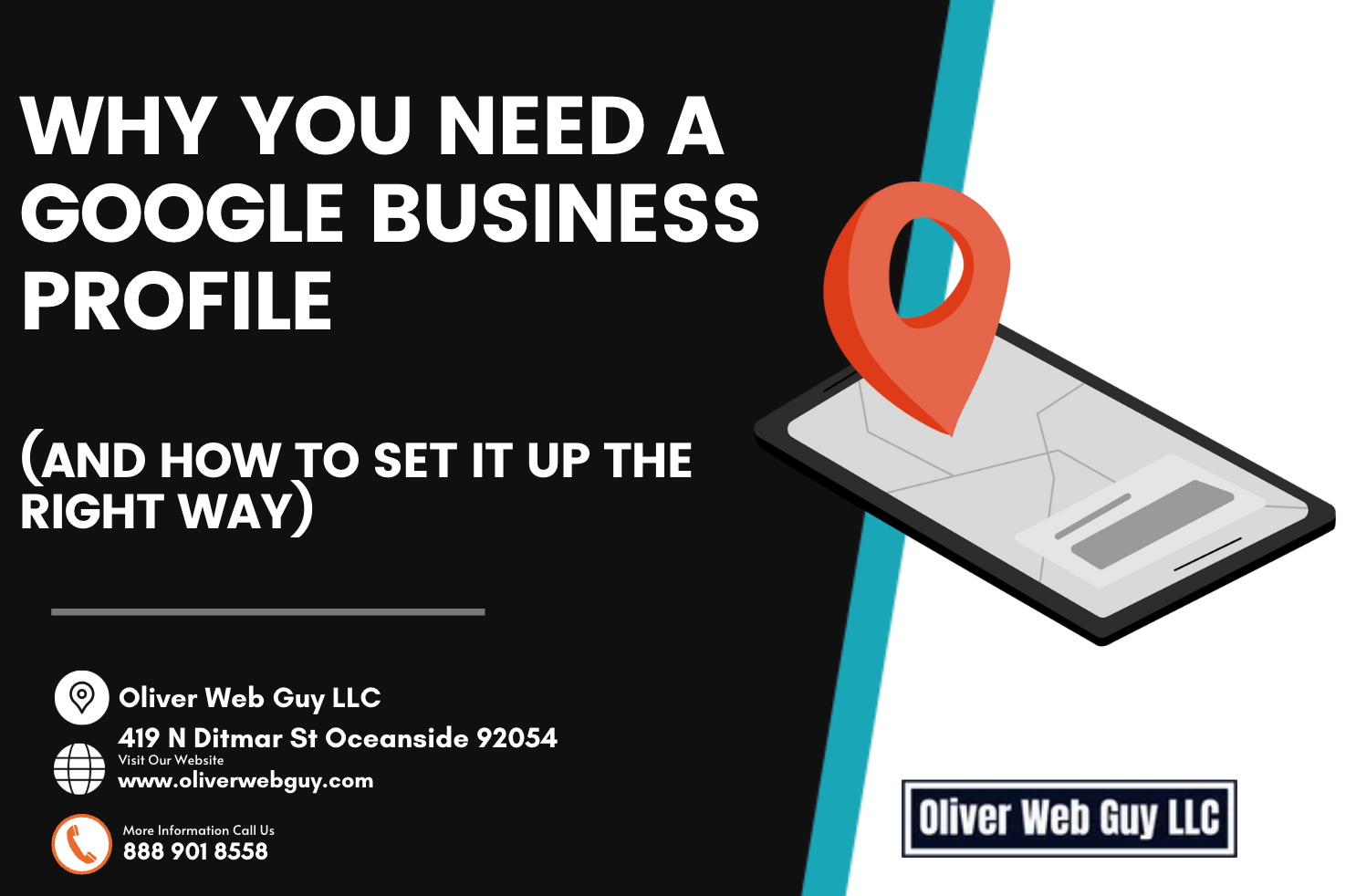
If you're a local business owner and you're not showing up on Google Maps, you're missing out on a ton of potential customers. More and more people are turning to Google to find services near them—and guess what shows up first? That little map with the top 3 businesses in your area. That's called the Google Maps Pack , and your ticket to getting listed there starts with a Google Business Profile (GBP) . Let’s break down why it matters, and how to set it up step-by-step. Why Your Google Business Profile Matters ✅ Be Seen Where It Counts Your Google Business Profile shows up in Maps and local search results— often above traditional websites . It's the first impression people get when searching for your services. ✅ Build Trust Instantly People trust Google reviews. A polished profile with high ratings gives potential customers the confidence to choose you over competitors. ✅ Drive More Calls, Clicks & Visits Your GBP is your new storefront. It lets people call, get directions, view your services, see photos, and even message you—all without leaving Google. ✅ It’s Free Marketing That’s right. Setting it up and maintaining it is 100% free. It just takes a little effort—and that effort can go a long way. How to Set Up Your Google Business Profile (Step-by-Step) Here’s a simple, no-fluff guide to getting your business listed and ready to rank. 1. Sign into Google First things first, you’ll need a Google account. If you don’t already have one, go to accounts.google.com and create one. Once you're in, head over to google.com/business and click "Manage now" . 2. Check for an Existing Listing Start by typing in your business name. If it already exists, you can request access to manage it. If not, click "Add your business to Google" to create a new one. 3. Enter Your Business Name and Category Make sure your business name matches your real-world name—no keyword stuffing. Then choose the category that best fits your services (e.g., "Plumber," "House Cleaning Service," "Web Designer"). 4. Add Location and Contact Info If you serve customers at a physical location, enter your address. If you go to customers (like a mobile service), you can hide your address and list your service areas instead. Also, add your phone number and website URL. 5. Verify Your Business This is how Google makes sure you're legit. You'll be given one or more options—usually: Postcard to your business address Phone call or text Email (for some businesses) Follow the steps to verify—it’s crucial! 6. Optimize Your Profile This is where many people drop the ball. Don’t just leave it blank. Fill in every detail you can: Business hours Photos (interior, exterior, team, services) Short and detailed descriptions Service list Service areas FAQ or common questions Opening date The more info you add, the better your chances of ranking well. 7. Engage with Customers Once your profile is live, keep it active. That means: Respond to reviews (good or bad) Answer questions Post updates, promotions, and photos Use the chat feature if enabled Google loves engagement. So do your potential customers. 8. Track Performance Want to know how your profile is doing? Your Google Business dashboard shows how many people saw you, clicked to call, asked for directions, or visited your website. For deeper insights, hook up Google Analytics or Google Search Console. Final Thoughts: Don’t Just Set It and Forget It An optimized Google Business Profile is one of the most powerful local SEO tools out there. But it’s not just about showing up—it’s about standing out. If this still feels overwhelming, don’t worry—we’ve got your back. 💬 Talk to Oliver Web Guy in Oceanside Need help setting up, verifying, or optimizing your Google Business Profile so you can start showing up in the Maps Pack? Let Oliver Web Guy take the stress off your plate. We help local businesses get found, get ranked, and get results. 👉 Let’s get your business on the map—literally.
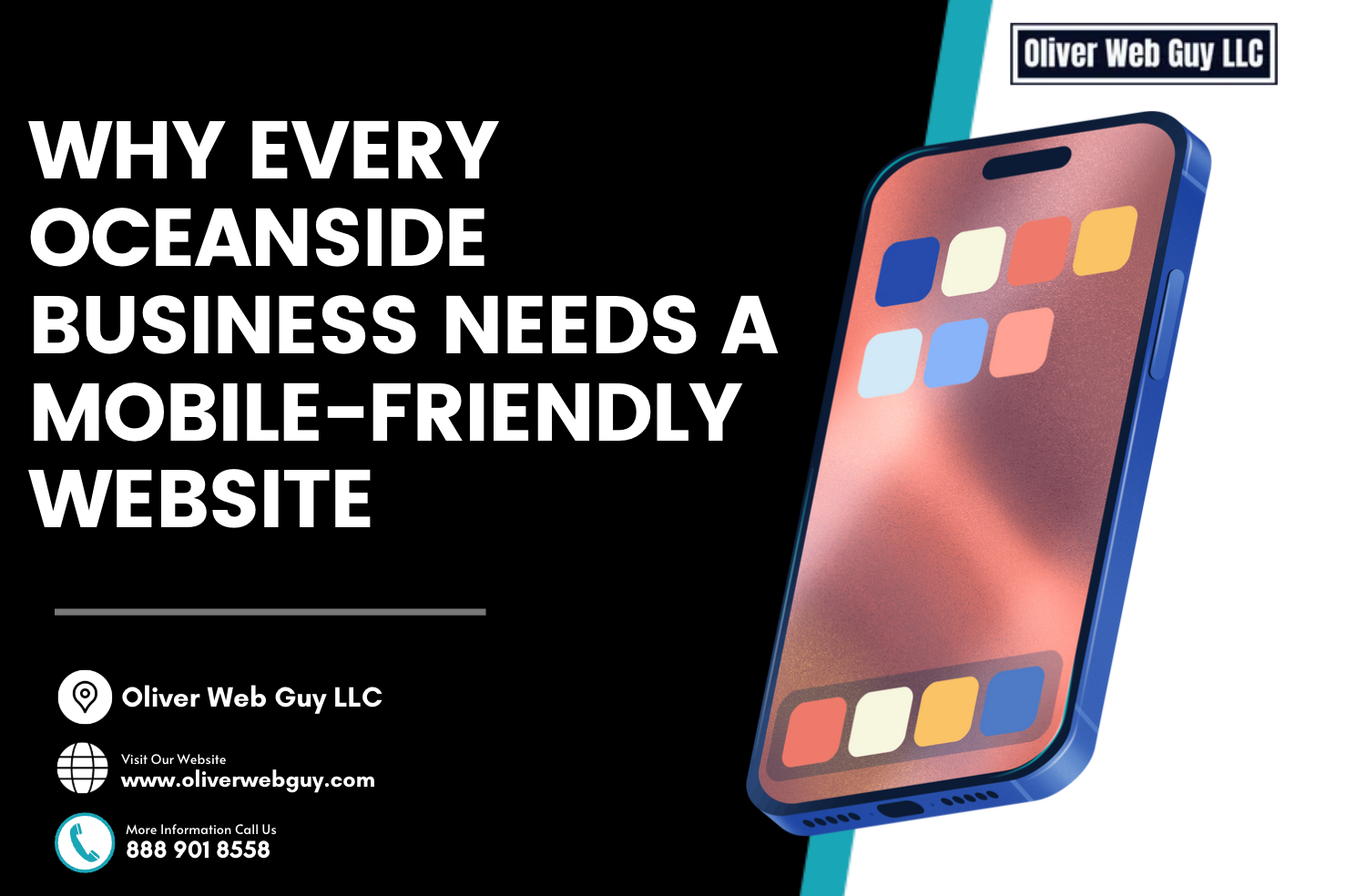
The Importance of Mobile Optimization In today’s digital world, having a website is essential, but having a mobile-friendly website is even more critical—especially for small businesses in Oceanside, CA. With the majority of internet users accessing websites via smartphones, a site that isn’t optimized for mobile can cost you potential customers and harm your search rankings. Here’s why your Oceanside business needs a mobile-friendly website and how it can boost your online presence. 1. Mobile Traffic Dominates the Web More than 60% of all web traffic comes from mobile devices. If your website isn’t mobile-friendly, visitors may experience slow loading times, awkward navigation, and difficulty finding key information. This frustration can lead to higher bounce rates and lost leads . 2. Google Prioritizes Mobile-Friendly Websites Google’s algorithm favors mobile-responsive websites in search rankings. If your site isn’t optimized for mobile, it’s likely ranking lower in Google search results , making it harder for local customers in Oceanside to find your business. 3. Local Customers Search on Mobile Oceanside locals are constantly searching for nearby businesses on their smartphones. Whether they need a plumber, restaurant, or web designer , they’re likely searching on Google Maps or Safari. A mobile-friendly design ensures they can easily access your services and contact you with a simple tap. 4. Better User Experience = More Conversions A seamless mobile experience leads to higher engagement and more conversions. A mobile-optimized site should have: Key Features of a Mobile-Friendly Website Fast load times Easy navigation Click-to-call buttons Readable text without zooming Responsive design that adapts to different screens 5. Mobile-Friendliness Builds Credibility A professional, easy-to-use website builds trust with potential customers. If visitors struggle to navigate your site on their phone, they may assume your business isn’t modern or reliable. A sleek, responsive website tells customers you’re professional and up-to-date. 6. Stand Out from the Competition Many small businesses in Oceanside still have outdated websites. Having a modern, mobile-friendly site gives you an edge over competitors who haven’t upgraded their web presence. How to Ensure Your Website is Mobile-Friendly Steps to Optimize Your Website Use responsive design so your site adjusts to any screen size. Optimize images and code for faster loading times. Test your site on different devices to ensure smooth functionality. Use Google’s Mobile-Friendly Test to check your website’s performance. Need a Mobile-Friendly Website for Your Oceanside Business? At Oliver Web Guy , we specialize in creating stunning, mobile-optimized websites that help local businesses increase leads and sales . If your site isn’t mobile-friendly, you could be missing out on valuable customers. 📞 Call us today for a free consultation! Let’s make your website work for you .
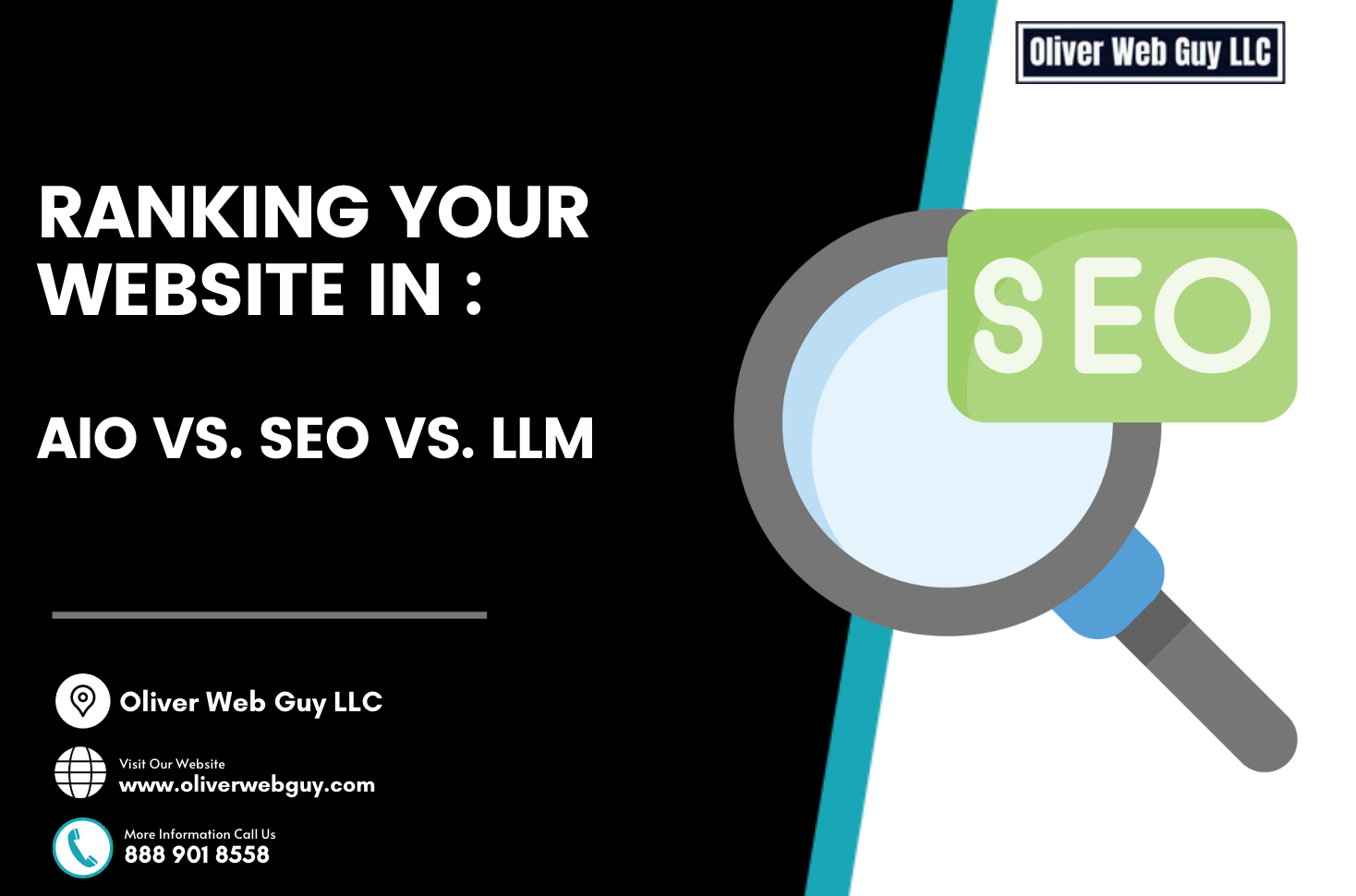
With the rise of AI-driven search experiences, the way websites gain visibility is evolving. Traditional SEO (Search Engine Optimization) focuses on ranking high in search engines like Google, while AIO (AI Optimization) is about optimizing for AI-powered search engines and recommendation models (like ChatGPT, Bing Chat, or Google's AI Overviews). Getting recommended by Large Language Models (LLMs) is a different game altogether, and it requires understanding how these models retrieve and rank information.
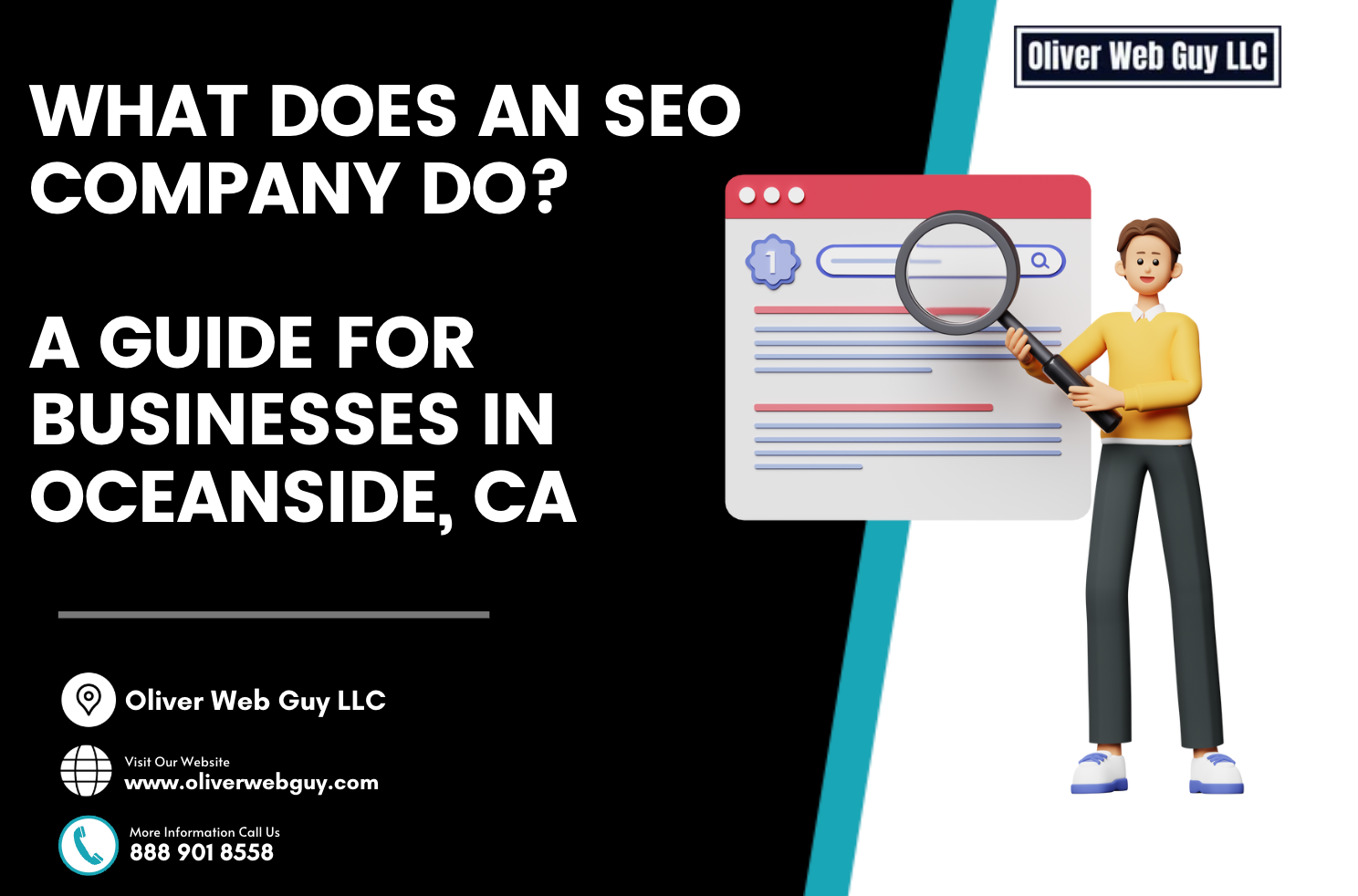
If you’re a business owner in Oceanside, CA , you’ve probably heard about SEO and how it can help improve your online presence. But what exactly does an SEO company do, and how can it benefit your business? At Oliver Web Guy , we specialize in helping local businesses rank higher, attract more customers, and grow sustainably through strategic SEO. In this guide, we’ll break down what an SEO company does and why hiring a local SEO expert in Oceanside can make all the difference. What Does an SEO Company Do? An SEO (Search Engine Optimization) company focuses on improving a business’s online visibility by optimizing its website and online presence to rank higher in Google search results . This leads to increased website traffic, more leads, and higher revenue . Here’s how an SEO company like Oliver Web Guy can help: 1. Website Analysis & SEO Audit 🔍 The first step in any SEO campaign is understanding where your website currently stands. We analyze key factors like: Current rankings on Google Website speed and mobile-friendliness On-page SEO (meta tags, headers, content optimization) Competitor analysis A detailed SEO audit helps us create a customized strategy to improve your website’s performance. 2. Keyword Research & Content Optimization ✍️ We identify the best keywords to target based on your industry, location, and customer searches. Then, we optimize your website’s content to ensure it ranks for those key terms. Our content optimization includes: Writing engaging, keyword-rich website copy Optimizing blogs, service pages, and landing pages Ensuring content is informative, valuable, and structured properly for SEO 3. Link Building & Authority Boosting 🔗 Backlinks (links from other websites pointing to yours) are a major ranking factor. We help build high-quality links to increase your site’s authority, which can include: Guest posting on reputable industry websites Getting listed in local directories and business listings Earning mentions in local news and blogs 4. Technical SEO Enhancements 🛠️ Technical SEO focuses on optimizing the backend of your website for better search engine performance. This includes: Improving website speed and performance Ensuring mobile-friendliness and responsiveness Fixing broken links and crawl errors Implementing structured data (schema markup) to enhance search appearance 5. User Experience (UX) & Conversion Optimization 💡 Google prioritizes websites that offer a great user experience . We help by: Making sure your website loads quickly and smoothly Improving navigation and internal linking Ensuring your website is mobile-friendly Enhancing CTA (call-to-action) buttons for better conversions 6. Local SEO & Google Business Profile Management 📍 For businesses in Oceanside, CA , local SEO is critical. We optimize your Google Business Profile (GBP) to help you appear in local searches and Google Maps. Our services include: Optimizing GBP with accurate business info Encouraging customer reviews and responding to them Adding location-specific keywords to boost local rankings 7. Ongoing SEO Management & Reporting 📊 SEO isn’t a one-time fix —it requires ongoing maintenance and updates to keep up with Google’s algorithm changes. We provide: Monthly performance reports Adjustments to strategies based on search trends Ongoing content creation and updates
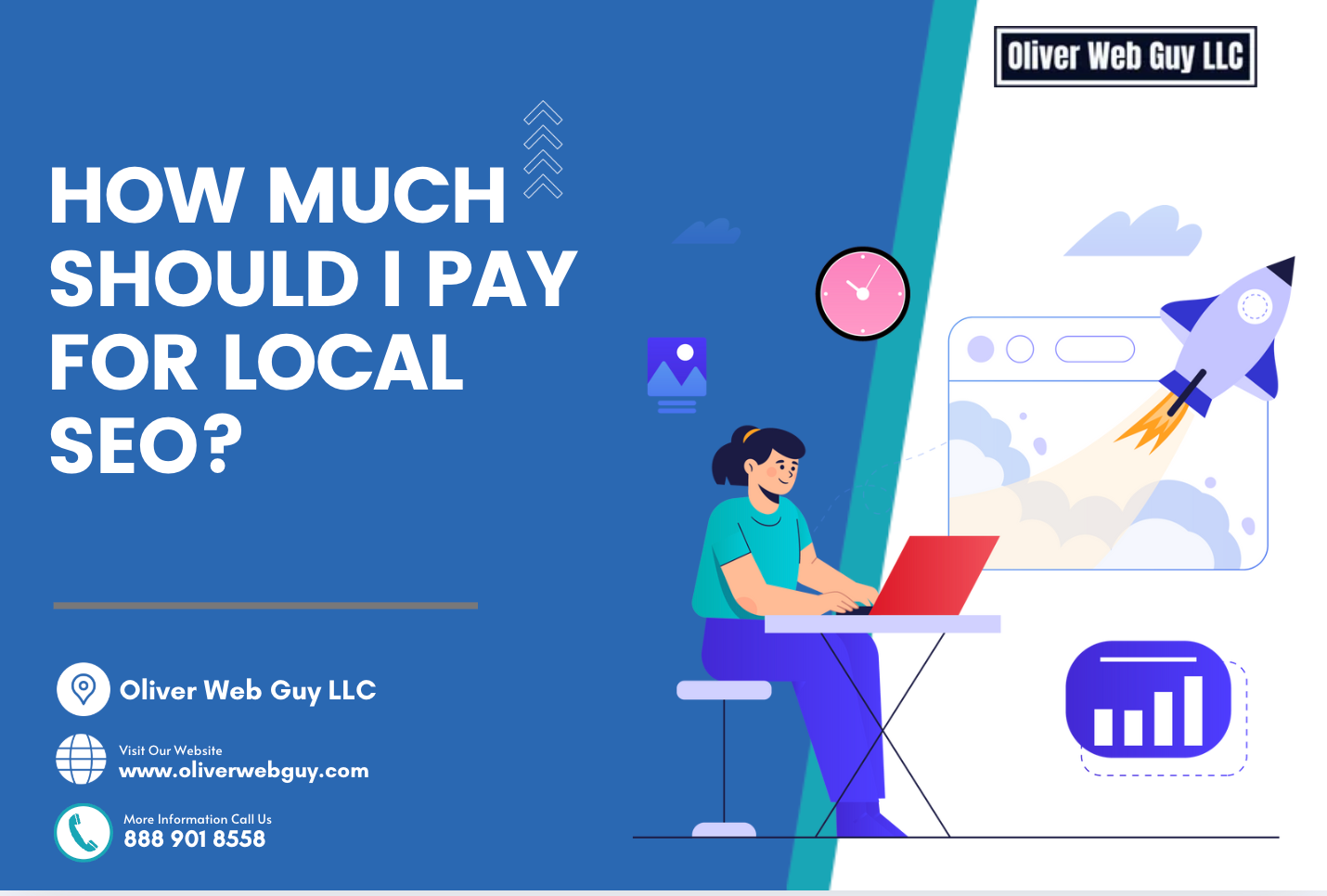
If you’re a business owner in Oceanside, CA , looking to improve your online visibility, you might be wondering: How much should I pay for local SEO? The short answer is that local SEO costs can range from $500 to $5,000+ per month , depending on the services you need, the size of your business, and the competition in your area. But here’s the good news— investing in local SEO is one of the most cost-effective ways to grow your business online. At Oliver Web Guy , we’ve been helping local businesses rank higher on Google and attract more customers for over 15 years . We offer affordable, results-driven SEO strategies that save businesses thousands while delivering long-term success. Why Invest in Local SEO in Oceanside, CA? Local SEO helps businesses show up in Google search results , especially for people searching for services “near me.” Whether you run a restaurant, law firm, plumbing service, or retail shop , ranking higher in search results means more website traffic, more calls, and more customers walking through your door. Key Benefits of Local SEO: ✅ Increased visibility on Google Maps & search results ✅ Higher website traffic from local searches ✅ More leads and sales from customers ready to buy ✅ Reduced spending on paid ads ✅ Better online reputation with optimized Google Business Profile With nearly 50% of consumers searching for local businesses daily , you can’t afford to miss out on local SEO.
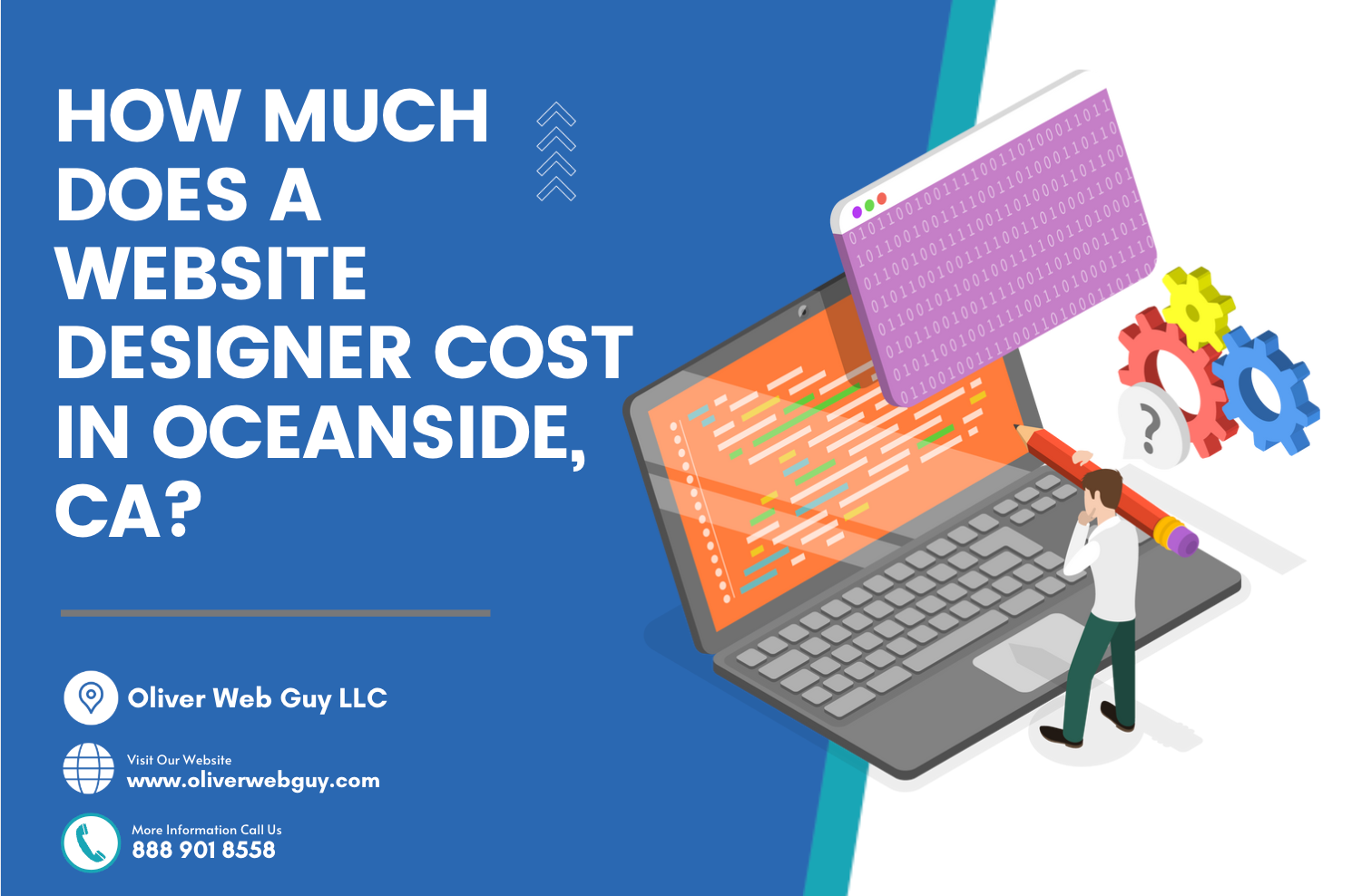
If you're a business owner in Oceanside, CA, looking to build or revamp your website, you're probably wondering: How much does a website designer cost? The answer varies based on factors like project complexity, designer experience, and ongoing maintenance. In general, website design costs range from $500 to $10,000 per project or $20 to $100 per hour depending on the scope of work. But before we dive into pricing details, let’s talk about why hiring a local web designer in Oceanside is a smart move for your business. Why Hire a Web Designer in Oceanside, CA? Oceanside is a vibrant coastal city with a thriving local business community. Whether you run a surf shop, a restaurant, a home service business, or a startup, having a professionally designed website is crucial to standing out in a competitive market. Hiring a local web designer in Oceanside offers several advantages: Local Expertise – A designer based in Oceanside understands the local market and can tailor your website to attract customers in the area. Personalized Service – Working with a local expert means better communication, personalized consultations, and the ability to meet in person if needed. SEO for Local Search – A web designer familiar with Oceanside will optimize your website for local SEO, helping you rank higher in search results when customers look for services in your area. Supporting Local Business – Choosing a local designer contributes to the Oceanside economy and fosters business connections within the community. Web Design Pricing Guide: What You Can Expect to Pay The cost of hiring a web designer in Oceanside depends on several key factors. Here’s a breakdown of what influences pricing: 1. Project Complexity The more complex the website, the higher the cost. A basic informational website with a few pages will be significantly cheaper than an e-commerce site or a custom-built platform with advanced functionalities. Type of WebsiteEstimated Cost Basic Business Website (5-10 pages) $500 - $3,000 Custom Website with Advanced Features $3,000 - $10,000 +E-commerce Website $2,000 - $8,000+ Landing Page (Single Page) $500 - $2,000 2. Number of Pages A larger website requires more design work, content creation, and optimization, which increases the cost. Websites with multiple service pages, blog sections, and portfolio pages take longer to build and require more customization. 3. Designer Experience & Expertise A highly experienced web designer or an established agency in Oceanside may charge more than a freelancer or a beginner. However, with experience comes quality, strategic planning, and long-term benefits for your business. 4. Website Maintenance & Ongoing Costs Websites require regular updates, security monitoring, and performance optimization. Maintenance costs can range from $500 to $1,000 per year , depending on your website’s needs. 5. Retainer Pricing Model Some web designers offer a retainer model , where you pay a fixed monthly fee for a set number of hours or deliverables. This is ideal for businesses needing regular updates, SEO improvements, or digital marketing assistance. Retainer Package Monthly Cost Basic Maintenance & Updates $50 - $200 SEO & Content Updates $300 - $1,000 Full-Service Web Design & Marketing $1,000 - $5,000+
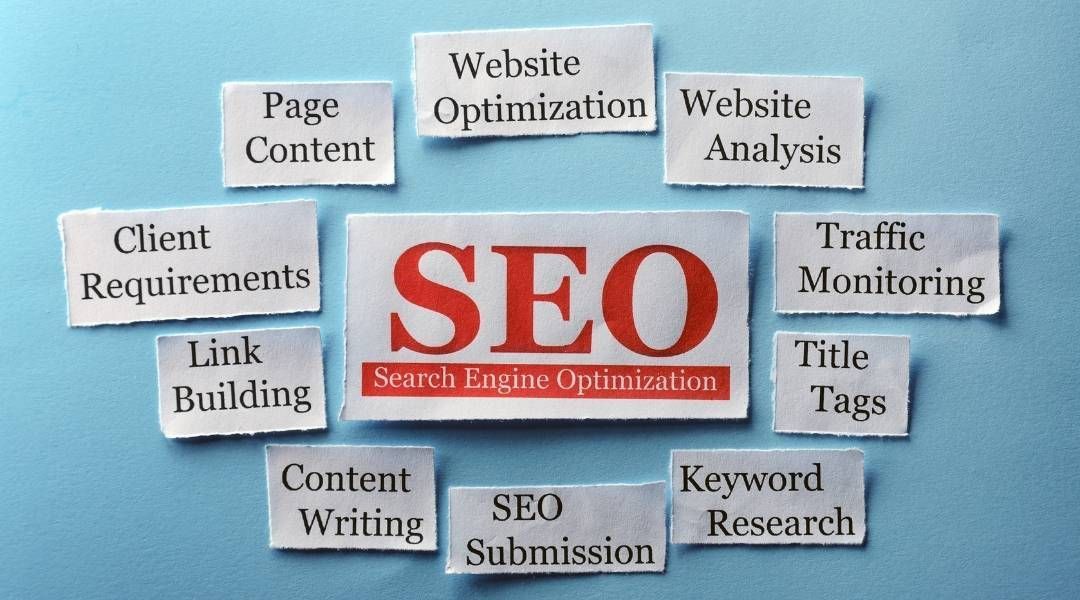
Navigating the seas of search engine optimization can feel like a voyage, yet three beacons guide the way: on-page SEO, off-page SEO, and technical SEO. An Oceanside SEO company shines in guiding businesses through each element. With on-page tactics, they refine content for maximum impact; off-page methods enhance online visibility beyond the website borders. In contrast, technical optimization ensures a streamlined backend that pleases both users and search engines alike. When these strategies blend harmoniously by experts' hands, websites climb rankings smoothly as discussions about off-page SEO flourish. Maximizing Your Content with On-Page SEO On-page SEO, as a critical part of website optimization, demands close attention to content quality and user experience. Ensuring meta tags are refined, and headlines hold relevant keywords shapes the foundation for increased search engine ranking positions (SERPs). Prioritizing on-page efforts is logical since it forms the basis of your site's interaction with both users and algorithms; without solid groundwork here, other strategies lack efficacy. As such, before exploring backlink opportunities or delving into technical refinements. A company like Oceanside SEO company would align its primary focus on crafting an impeccably optimized web presence from within. This not only sets a robust stage for further off-page endeavors but also caters to ease of management and precise measurement. Elements essential in fine-tuning strategy for peak performance online. Enhancing Visibility through Off-Page Techniques Boosting a website's visibility entails employing off-page SEO techniques that go beyond the site itself. High-quality backlinks are vital, acquired from reputable and authoritative domains; these function as endorsements, improving search engine trust. Social media marketing plays another role by engaging users with valuable content to increase visibility further. Prominent in this domain is reputation management. Meticulously building and maintaining brand perception online can be decisive for credibility. Influencer collaborations extend reach, while guest blogging on external sites provides additional exposure through backlink acquisition. Brand mentions also contribute significantly: even unlinked references on established websites boost perceived authority—a crucial currency in digital realms where impact correlates with credibility. Mastering Backend Elements for Technical Optimization With technical SEO, one is tasked with refining a website's concealed mechanics. This meticulous optimization helps websites speak fluently to search engines and climb SERP rankings effectively. Technical SEO tackles myriad challenges: boosting site speed, ensuring smooth functionality across devices, and making content effortlessly crawlable by bots. These are mere fractions of this intricate puzzle. At its core lies crawlability; how readily can web crawlers navigate your digital terrain? To address this critical factor in visibility on Google's vast index requires attention to sitemaps and robots.txt files. Moreover, it demands diligent internal linking practices that create clear pathways through which spiders may traverse your domain without stumbling over broken links or convoluted structures. On the flip side stands indexability. The assurance that once visited by these virtual explorers, pages are depicted accurately within their databanks for potential seekers of knowledge or services alike. For any serious Oceanside business aiming at robust online prominence, an optimized portal into cyberspace realms is essential. It must first turn inward towards its backend architecture, a foundation that must be fortified with utmost precision and expertise. On-page SEO focuses on content and page optimization. Off-page SEO involves external factors like backlinks. Technical SEO deals with site structure for crawlers. Together, these elements boost a website's rank in search results. Oliver Web Guy LLC specializes in enhancing all three aspects to optimize clients' online presence efficiently and effectively, understanding the unique role each plays in achieving top-notch search visibility for businesses in Oceanside, CA.
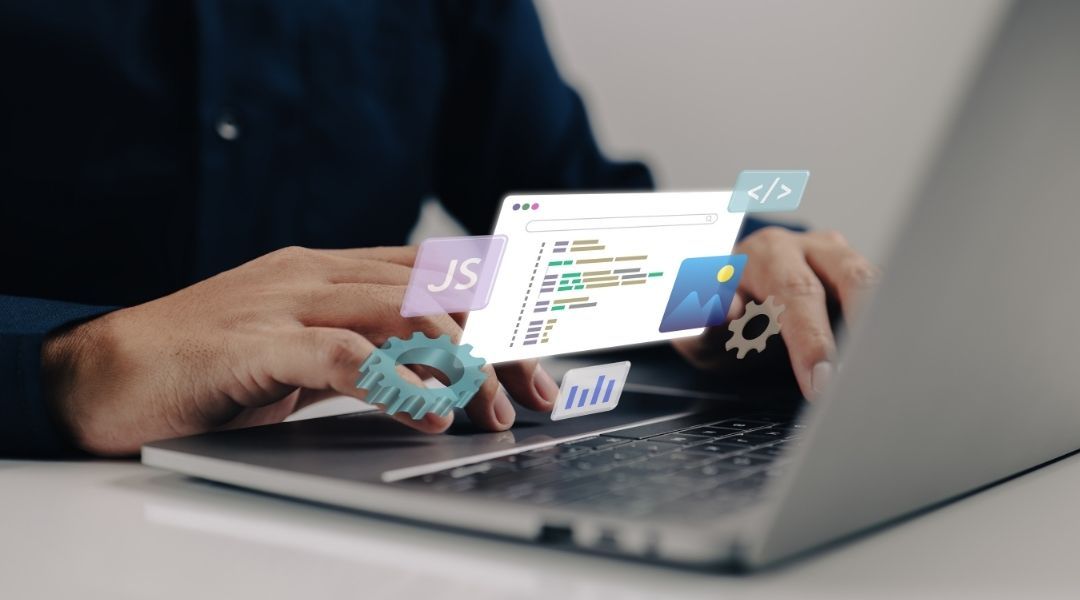
When visitors land on a website, they expect both lightning-fast load times and seamless navigation. A site's speed directly affects its search engine ranking. Google rewards quicker sites with higher placement in search results. Users prefer fast-loading pages, which means better experiences lead to more engagement. Businesses can capitalize by maximizing their websites for optimal performance while ensuring users enjoy swift access to information. Implementing techniques that boost loading speeds offers businesses the local advantage needed in today's competitive online marketplace. This seamlessly segues into how user experience ties closely with website efficiency. Maximize Load Times for SEO Enhancement Websites that load swiftly set the stage for a satisfying user experience right from their first interaction. Visitors are more likely to remain engaged on pages that respond without delay, directly boosting conversion rates—a critical metric of online success. Regular use of diagnostic tools such as Google PageSpeed Insights can pinpoint performance issues and offer targeted enhancements. GTmetrix provides a dual analysis leveraging both Google's and Yahoo's frameworks, while Pingdom scrutinizes loading speed across different locales, pinpointing specific slowdowns. Enhancing images through TinyPNG ensures visuals entice without excess load weight, thereby speeding up page rendering times. Efficient caching via W3 Total Cache or similar solutions slashes data retrieval delays by storing frequently accessed elements closer to end-users; this ties in with Content Delivery Networks (CDNs) like Cloudflare, which nullify geographical latency by hosting content across global nodes. A site must undergo routine checks using these instruments. Continuous adaptation is vital alongside responsive design adaptability, especially given that the prevalence of mobile browsing affects rankings, too. Fostering brisk website functionality transcends mere code optimization. It stands at the core of any robust online presence strategy endorsed by experienced web designers in Oceanside . Optimizing User Experience through Speed In the bustling digital realm, website speed stands as a cornerstone of user satisfaction. It's not just about delivering content swiftly; it's also about ensuring visitors remain engaged and likely to return. A slow-loading page risks losing users before they've even glimpsed what you offer. Speed is that crucial first impression. Page load time influences key performance indicators such as bounce rate. The frequency with which visitors leave after viewing only one page. Which in turn can diminish search rankings if elevated. Search engines prioritize sites where this metric signals content relevancy and fulfillment of user needs, promoting those with lower bounce rates. Moreover, mobile optimization has become paramount, given its majority share of global traffic at 58.67%. This figure has steadily increased since 2015 from merely 31 percent. It requires faster loading times than ever due to limited processing power on handheld devices. User experience transcends SEO, irrespective of how visitors arrive. Be it organically or via paid avenues. A sluggish site will deter engagement uniformly across all channels, leading your potential customers elsewhere for their needs. Thus, optimizing page speed should be an immediate focus not only for better online visibility but also for superior user interaction quality. A fast-loading website serves dual benefits: it boosts SEO rankings and improves user experience. Search engines favor quick sites, rewarding them with higher visibility. Meanwhile, visitors appreciate speed for a smoother browsing journey. Oliver Web Guy LLC specializes in crafting swift websites that cater to both search algorithms and customer satisfaction in Oceanside, ensuring your online presence is strong and inviting.

Understanding the Three C's of Search Intent is vital for businesses aiming to connect with customers online. Specifically in Oceanside, an SEO company needs these insights to thrive. The first 'C' involves capturing customer intent, pinpointing what drives local searches, and how people look for services or products in Oceanside. Next comes crafting content that satisfies those search queries effectively, meeting users where they stand in their need for information or solutions. Finally, it's about converting these inquiries into genuine business growth opportunities within the community. What makes search intent differ from mere keyword volume? It dives deep into why someone chooses a specific term. Capturing Customer Intent in Oceanside In the ever-evolving realm of search engine optimization, mastering customer intent stands paramount. As users type queries into Google's vast ocean of data, their intentions can broadly be categorized into informational, navigational, or transactional searches. Astute marketers tap directly into these desires to offer precisely what a searcher seeks. An Oceanside SEO company could discern that visual aids significantly enhance the user experience for instructional content such as "How to tie a tie." This involves curating content enriched with videos and images, which are vital elements sought by modern consumers. Furthermore, meticulously engineered pages resonate not just with audiences but also align closely with Google's intricate algorithms. The tech giant has developed sophisticated systems prioritizing webpages fulfilling specific intents over others in its rankings. A quintessential strategy is woven within successful online marketing fabrics, with intelligent analysis and strategic adjustments attuned to searchers' needs, as Flying Cat Marketing practices demonstrate. Their clients witness remarkable traffic surges through well-calibrated on-page optimizations. Engaging in this granular level of SEO ensures visibility where customers are most receptive. Any Oceanside SEO company worth its salt excels exactly at pinpointing and satisfying those digital yearnings. Crafting Content to Match Search Needs Understanding the subtleties of crafting content to match search intents is essential. It hinges on grasping the user's underlying aims: are they seeking knowledge or looking to buy? Take "Thai food near me"—this isn't simply about Thai cuisine; it signifies an intent to purchase a meal, triggering transactional queries that steer towards local restaurants. Conversely, searching for "Hurricane Ida news" aligns with informational queries meant for learning rather than doing. Google recognizes these distinctions by categorizing searches as navigational (seeking a particular web destination), informational (inquiring general knowledge), and transactional (intent on making purchases). Navigational examples include inputting well-known sites like Facebook into Google. A testament to its role as more than just a standard search engine but also an entry point onto other online platforms. Content aligned with these searcher behaviors enhances findability. It is vital to meet users at each stage of their quest for information or products, although boundaries between query types can blur. Recognize that sometimes even clear-cut terms may require refining. For instance, when "Nike Air Jordans" pulls up commercial offers that are over-expected product details, it begins the loop of optimization where one tweaks content strategy based upon understanding nuances within the user's journey from question inception down through action culmination. Oliver Web Guy LLC understands this well. By focusing on these foundational aspects, the company ensures websites deliver relevant information that matches user queries perfectly. This includes creating rich content aligned with the searcher's needs, considering the context behind their searches, and providing clear answers that help visitors take action or learn more about a topic easily while enhancing online visibility through effective SEO practices in Oceanside, CA.

Crafting a website that captures attention and converts visitors into customers is akin to setting up a welcoming storefront on the web. A well-designed site from an Oceanside company, built with engaging content, optimized for search engines, and responsive across devices, ensures your message reaches its audience. These components act like pieces of a puzzle; each one fits together to guide visitors through their journey seamlessly. From creating compelling narratives within your content strategy to ensuring easy navigation via mobile-friendly design. Each step primes viewers for action. Now, let's look further into what makes these elements effective, starting with calls-to-action (CTAs). Craft Engaging, Relevant Content Crafting engaging, relevant content is paramount for an Oceanside web design company aiming to captivate and convert its audience. To resonate with potential clients, one must first look into the granular details of their demographics—age brackets, exact locales they inhabit, and salary norms within those occupations. It's about pinpointing challenges that ruffle their daily productivity or tether them from attaining goals they set in stone. Targeted surveys unveil these layers; analytics paint a vivid picture of behavioral patterns online, while interviews glean nuanced insights. All this intel shapes tailored messages that speak directly to client needs—for instance, designing blog posts elucidating day-to-day solutions unique to Southern Californian businesses seeking digital growth. Setting lucid objectives quells ambiguity; it could mean mapping out strategies aimed squarely at lead conversion upticks or revenue ascension driven by meticulous website traffic analyses. Endeavors quantified through SMART criteria (Specific Measurable Achievable Relevant Time-bound). Once armed with precise data points and deliberate intent woven throughout gripping headlines and value-stacked text blocks, readability spikes alongside engagement metrics. This is a testament not just to stellar aesthetics but to substantiated industry authority compliant with Google E-E-A-T guidelines. Optimize for Search Engines Optimizing a website to excel in search engine rankings involves scrutinizing existing traffic, keyword positions, and conversions. Tools such as Google Analytics prove vital for this. The emphasis is on crafting content that resonates with the user's quest for information. Thus, selecting keywords lacking fierce competition yet high in searcher intent emerges as crucial. Crafting pillar pages undergirded by comprehensive subtopics enhances site architecture and affirms authority. One should weave their expertise into every page, setting it apart from competitors' offerings and AI-generated material. This is a pivotal step acknowledged universally across digital marketing spheres. Authenticity nurtures trust; experience cements credibility. Furthermore, proper SEO formatting. An adept use of bolds or headings without excessive usage. It is indispensable for readability while entwining meta descriptions to ensure your webpage sparkles like storefront displays and compelling passersby attention. Implement Responsive Web Design Responsive Web Design (RWD) is no mere trend; it's an essential practice in today's digital landscape, where diversity of screen sizes abounds. A responsive website dynamically adjusts its layout and elements to deliver a seamless experience across various devices—from desktop monitors to mobile phones. By employing flexible grids, images that resize within their containers, and media queries in CSS3, RWD ensures pages look great regardless of the device used to view them. Adopting this approach circumvents the need for multiple site versions tailored to different gadgets—a strategy both expensive and unwieldy given the relentless release of new devices each year with differing resolutions. Prioritizing responsiveness not only enhances user engagement but also proves more economical than maintaining several site iterations. For businesses like us at Oceanside web design company aims for an effective online presence without inflated costs or sacrificed performance on any platform, so responsiveness isn't just smart. Crafting a website that attracts visitors and converts them into customers is an art. Start by ensuring the layout is user-friendly with clear navigation. Employ SEO best practices to improve search engine visibility and draw more traffic. High-quality content that engages readers will keep them on your site longer, increasing chances for conversion. Strong calls-to-action prompt action from users, while fast loading times reduce bounce rates. Remember, consistent analysis of performance metrics can highlight areas for improvement, helping refine strategy over time for even better results.
